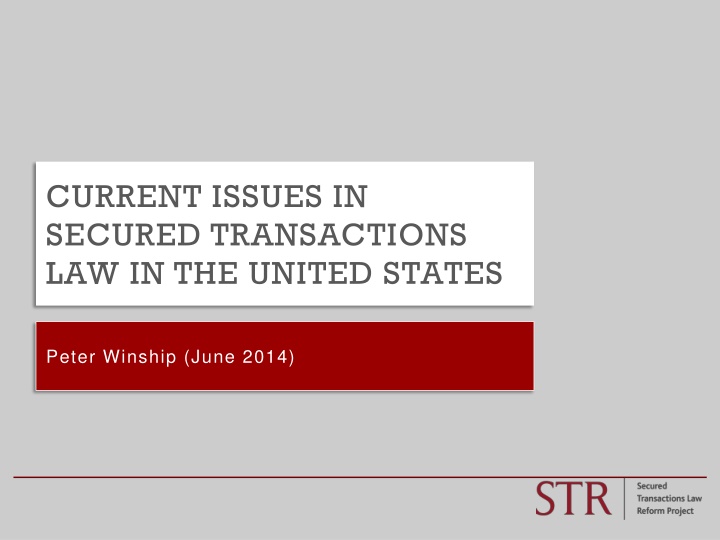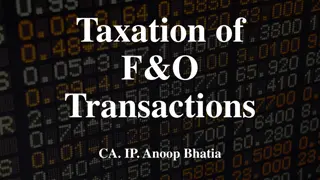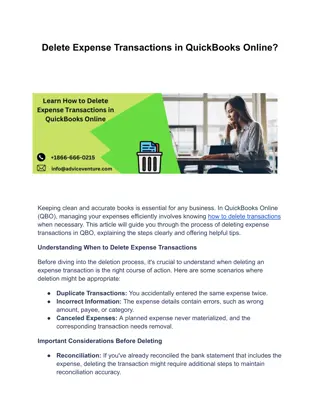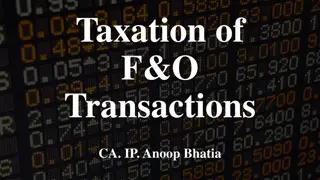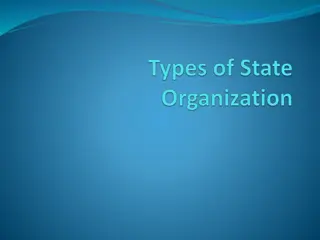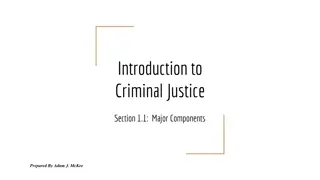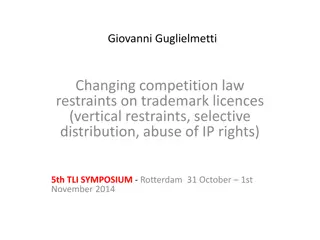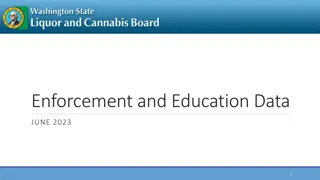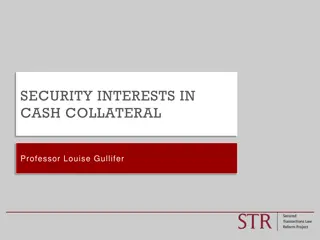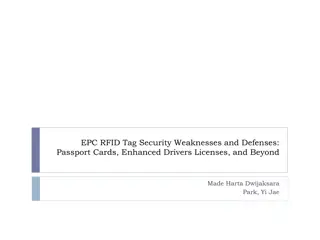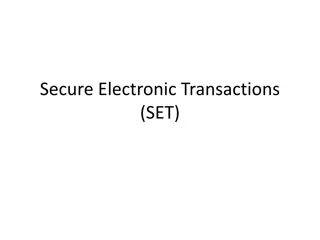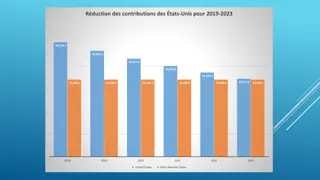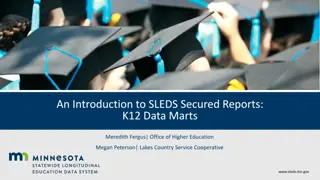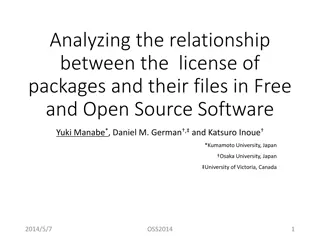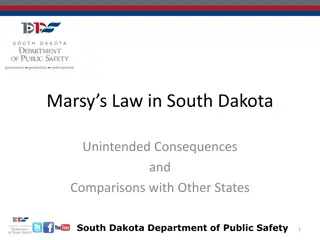Current Issues in Secured Transactions Law in the United States: Licenses and Security Interests
This article discusses the current issues in secured transactions law in the United States, focusing on whether a debtor can grant a security interest in a statutory or contractual license, how syndicated financiers can perfect a security interest in a deposit account, and the collateral over which a secured party should have purchase money priority. The Uniform Commercial Code (UCC) Article 9 governs security interests in personal property, with the 1998 revision being significant. The complexities surrounding licenses and security interests, particularly in cases like liquor licenses, are explored, highlighting legal provisions and considerations.
Download Presentation

Please find below an Image/Link to download the presentation.
The content on the website is provided AS IS for your information and personal use only. It may not be sold, licensed, or shared on other websites without obtaining consent from the author.If you encounter any issues during the download, it is possible that the publisher has removed the file from their server.
You are allowed to download the files provided on this website for personal or commercial use, subject to the condition that they are used lawfully. All files are the property of their respective owners.
The content on the website is provided AS IS for your information and personal use only. It may not be sold, licensed, or shared on other websites without obtaining consent from the author.
E N D
Presentation Transcript
CURRENT ISSUES IN SECURED TRANSACTIONS LAW IN THE UNITED STATES Peter Winship (June 2014)
ISSUES ADDRESSED Three issues addressed: 1. May a debtor grant a security interest in a statutory or contractual licence? 2. How may syndicated financiers perfect a security interest in a deposit account? 3. Over what collateral should a secured party be given purchase money priority?
UCC ARTICLE 9 US law for security interests in personal property is Article 9 of the Uniform Commercial Code: State law, not federal law Individual states may amend so like a model law Where applicable, federal law preempts UCC first adopted in 1951 Comprehensive revision in 1998 Most recent amendments 2010 Adopted except in NY and Oklahoma
I. LICENCES Example 1. Restaurant holds liquor licence issued by State Liquor Board. State law prohibits assignment of licence without Board s consent. Restaurant grants Bank a security interest in all its business assets, including licence, to secure repayment of bank loan. Bank duly perfects its interest. Restaurant defaults and commences insolvency proceeding. With consent of Liquor Board, business assets including the licence are sold as a going concern. Does Bank have an enforceable security interest in proceeds of this sale?
LICENCE (2) 1998 revision introduced 9-408: Overrides any term of statutory or contractual licence that prohibits, restricts or requires the consent of licensor to creation, attachment or perfection of a security interest in the licence. But at same time leaves the licensor s rights unaffected in all material respects. one of the most intractable provisions of the Uniform Commercial Code
LICENCE (3) Is the liquor licence personal property? Article 9 does not answer; look to other law Virtually all states recognize that holder of liquor licence may grant security interest in the licence if it is transferable Depends on wording of liquor licensing law No difficulty articulating policy, but Difficulty articulating nature of right in licence Crucial interest is right to what is received on transfer of licence
LICENCE (4) Assuming liquor licence in Example 1 is personal property, the licence is a general intangible ( 9-102(a)(42)) Section 9-408 has following consequences: Liquor law requirement that Liquor Board consent to transfer ineffective; Restaurant s grant of security interest in licence is effective Bank may not enforce security interest but has right to whatever is received on transfer of licence made with Liquor Board s approval
LICENCE (5) Bank has security interest in present right to proceeds not in proceeds received on subsequent transfer of the licence Distinction important in bankruptcy proceeding: Security interest in existing property and their proceeds created before commencement of bankruptcy proceeding is effective in bankruptcy proceeding (BC 552(b)) In Example 1, before bankruptcy Bank had a security interest in right to proceeds and the proceeds of that right; when licence sold Bank has enforceable security interest in proceeds of this right; BC 552 satisfied
LICENCE (6) Initial proponent of 9-408 recognized proposal is of principal value to lenders to cash flow businesses Such businesses have few valuable assets other than licence (or equivalent, such as franchise) Lender relies on payment from the cash generated by the business rather than on security interest in tangible assets Lender has strong incentive to keep business operating, thereby creating good will Lender, rather than general unsecured creditors, should be entitled to good will realized when business is sold as going concern Smith (1994) 28 Loy LA L Rev 335
LICENCE (7) Example 2. Developer agrees to grant SME a non- exclusive licence of its computer software. One term of the agreement provides that an attempt by SME to assign rights in the software entitles Developer to terminate the licence. A second term prohibits SME from disclosing to anyone certain information regarding the software. If SME seeks financing secured by a security interest in the licence, what legal or practical obstacles will it face?
LICENCE (8) Section 9-408 covers contractual as well as statutory licences ( 9-408(a)) Terminology confusing ( 9-408, Comment 5) Licence is a general intangible Developer (licensor) is account debtor ( 9- 102(a)(3)) SME (licensee) is debtor Nature of SME s property interest in licence may be limited to promise of Developer not to sue for SME s use of Developer s software
LICENCE (9) In Example 2: 1stterm: Developer s right to terminate if SME attempts to grant a security interest is ineffective to the extent it impairs creation of the security interest ( 9-408(a)(2)) 2ndterm: this contract restriction is not covered by 9-408(a) so term is not made ineffective (cf. 9- 408(d)(5)) As practical matter, potential lender to SME must decide whether to make loan without full information about Developer s software
LICENCE (10) Section 9-408 modeled on approach to security interests in broadcast licences issued by the Federal Communications Commission Weise, (1999) 74 Chi-Kent L Rev 1077 FCC and UCC 9-408 appear to differ: FCC not allow security interest in licence; UCC allows security interest in licence Federal Circuit Court recently ruled that difference is semantic using concept of property as a bundle of rights: FCC allows security interest in one right (right to proceeds on transfer of licence) UCC allows security interest in total bundle of sticks but then takes away rights, such as enforcement rights, that affect licensor In re Tracy Broadcasting Corp., 696 F.3d 1351 (10thCir. 2012), cert. denied, 133 S Ct 2340 (2013)
II. DEPOSIT ACCOUNTS Pre-1998 Article 9 recognized security interests in deposit accounts only when proceeds of other collateral could be traced into the account At common law creditors could take a security interest in bank account but non-uniform Bank could not take security interest in account maintained with it; but bank had rights of recoupment and set-off 1998 revision permits both third party and depository bank to take security interest in deposit account as original collateral
DEPOSIT ACCOUNTS (2) Control a key concept: Attachment: control pursuant to security agreement equivalent to authenticated security agreement ( 9-203(b)(3)(D)) Perfection: only by control filed financing statement ineffective ( 9-312(b)(1); 9-314) Priority: security interest with control usually has priority ( 9-327)
DEPOSIT ACCOUNTS (3) Obtaining control of deposit account ( 9-104): Bank with which account is maintained deemed in control if security agreement with Debtor covers deposit account ( 9-104(a)(1), 9-203(b)(3)(D)) Third party has control when: it concludes Deposit Account Control Agreement with Bank and Debtor ( 9-104(a)(2)); or it become Bank s customer with respect to the account ( 9-104(a)(3)) Control not defeated if B entitled to deal with account ( 9-104(b))
DEPOSIT ACCOUNTS (4) Example 3. D maintains a deposit account with Bank A. To secure a loan from Banks X, Y and Z, D creates a security interest in the deposit account in favour of Bank A, as agent for the three banks. Do Banks X, Y and Z have a perfected security interest in the bank account? Source: Query on UCC Listsev (25 September 2012)
DEPOSIT ACCOUNTS (5) 2010 Amendment to Official Comment 3 to 9-104 (but without amending black-letter text) adds an Example exactly on point Answer given: Because Bank A is a secured party as defined in Section 9-102, the security interest is perfected by control under (a)(1). Nothing said about agency relation.
DEPOSIT ACCOUNTS (6) Listserv participants commented: Agent/Trustee held property (perfected security interest) for Principals, citing Restatement 3rdAgency 8.12, Comment b Some recommended all banks conclude a deposit account control agreement spelling out relationship between banks on matters such as shifting control to successor agent, disclaimers of liability, indemnity If DACA concluded, one suggested adding statement that it entered into just in case court finds Bank A deposit does not perfect Other commentators recommend agreement with Bank A subordinating its rights of recoupment and setoff
DEPOSIT ACCOUNTS (7) Drafters discover agency and trust law: Restatement 3rdAgency 8.12 (Duties regarding principal s property), Comment b (2006): An agent s possession or control of property on behalf of a principal is tantamount for many purposes to possession or control of the principal [citing, inter alia, UCC 9-104] Restatement 3rdTrusts 2, Comment i (2003): Trust res may include claim against trustee Authority and logic of prior restatements meager and dubious Reporter s Note: contrary to prior restatements; change supported by practical considerations as well as [it avoids] strained explanations of sensible results
DEPOSIT ACCOUNTS (8) Example 3 (var. a). D maintains a deposit account with Bank A. D creates a security interest in the deposit account to secure a loan from Banks X, Y, Z, and A. The banks appoint Bank A as collateral agent. Do Banks X, Y, Z and A have a perfected security interest in the bank account? Listserv commentators: slight hesitation Bank A is a secured party as depository bank Most commentators consider all banks are perfected by Bank A s perfection of interest Need for agreement between banks stressed as even more needed
DEPOSIT ACCOUNTS (9) Example 3 (var. b). D maintains a deposit account with Bank A. D creates a security interest in the deposit account to secure a loan from Banks X, Y, and Z. The banks appoint Bank A as collateral agent. Do Banks X, Y, Z have a perfected security interest in the bank account? Listserv commentators: greater hesitation Bank A is no longer a secured party Even if take security interest when account opened not necessarily to secure other banks security interest
III. PURCHASE MONEY SECURITY INTERESTS A recent study of whether English law recognized purchase money security interests (PMSIs) notes: SMEs have difficulty attracting capital Growing importance of intangible assets Study recommends: English law should recognize such an interest in well- defined circumstances Legislatures are better equipped than courts to resolve the competing economic policy issues involved There should be public consultation followed by legislation Urged consideration of foreign legislative models Boadle, [2014] LMCLQ 76
PMSI (2) From mid-19thcentury the concept of the purchase- money security interest (PMSI) was recognized in federal and state common law as an interest with priority over earlier creditor with an interest in debtor s after-acquired property UCC Article 9 codified concept in 1951 Pre-1998 text suggested that there could be a purchase- money interest in collateral (i.e., all personal property, including fixtures) Grant Gilmore suggested (1963) that there could occasionally be a purchase money interest with priority in general intangibles
PMSI (3) 1998 revision limits purchase-money security interests to goods and software (UCC 9-103(b), (c)) Goods includes software embedded in goods Software is separate category: in PMSI context, seller or third-party financer finances debtor s acquisition of goods and software to be used in these goods No explanation for limiting the types of collateral in which a secured party might have a purchase money security interest UCC Article 9 also provides that later security interest in some intangible property has effective priority without being called a PMSI (e.g. 9-330)
PMSI (4) No explanation for limiting the types of collateral in which a secured party might have a purchase money security interest Possible explanations: There had been little if any practice of purchase-money claims as to non-tangible collateral During drafting process there was no demand from debtors or interested financers of other non-tangible collateral Time pressure to complete revision Separate uniform law projects underway to provide rules for licences in intangible property (UCITA) Intellectual property complicated by federal law coverage which preempted state law, such as UCC Article 9 Intellectual property practices not yet ripe for codification
III. PMSI (5) Example 4. X Inc. grants SP-1 a security interest in all the corporation s existing and after-acquired assets to secure repayment of a loan. SP-2 subsequently lends money to X Inc. to enable it to acquire Inventor's patent. X Inc. grants SP-2 a security interest in the patent to secure repayment. As between SP-1 and SP-2, which creditor has priority if X Inc. defaults on both loans? ANSWER: SP-1. Patent is a general intangible and therefore not a good. The general priority rule first to file or perfect ( 9-322) gives priority to SP-1 s prior interest.
PMSI (6) Comments: SP-1 has potential windfall SP-1 has situational monopoly because of information and transaction advantages so obtains monopoly rents But intangible property may be risky therefore new intangible asset potentially dilutes SP-1 s risk assessment SP-2 may be in better position to assess riskiness of new intangible asset Need for empirical research into business practices
